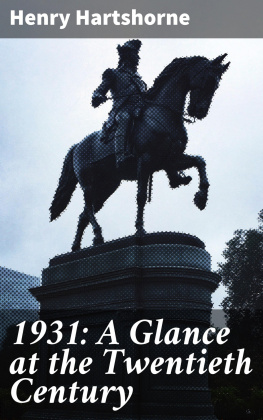| Note: | Images of the original pages are available through the the Google Books Library Project. See http://books.google.com/books?vid=lU2J-EFFzjgC&id |
1931:
A GLANCE AT THE
Twentieth Century.
BY
HENRY HARTSHORNE.
"COMING EVENTS CAST THEIR SHADOWS BEFORE."
PHILADELPHIA:
E. CLAXTON & CO.,
930 Market Street.
1881.
Copyright secured.
1881.
COLLINS, PRINTER.
The contents of the following pages are taken from a diary, supposed to be written in 1931, by a gentleman of leisure and good opportunities for observation.
Should any reader be inclined to hold the editor or author responsible for what is thus recorded, be it remembered that very little is expressed concerning what ought to be; the chief purpose being to show rather what will probably occur.
1931:
A GLANCE AT THE TWENTIETH
CENTURY.
January 1, 1931.
I begin to-day to jot down occasional notes of whatever interests me most, in private or public affairs.
Much sympathy is just now felt everywhere for the ex-queen of England in her enforced retirement. She would have been perfectly safe in returning to England; and she will, probably, before long, again take up her residence at Osborne or Balmoral; but the extreme unpopularity of the ex-king makes his return at least undesirable.
During our present, 71st Congress, meeting at St. Louis, a motion will be made by a member from Texas for the admission of Mexico as a State. When this is effected, Mexico will be the fifty-second State of our Union. Some Senators are understood to doubt the advantage to the country, at the present time, of this admission, on account of the constitutionally unsettled character of the population. Since Protestantism has so generally prevailed there, however, Mexico is said to have greatly improved. The acceptance of the whole of Central America, in the form of three Territories, must soon follow. For this also, but little can be urged, except the now very old argument of "manifest destiny." Commercial men say that it is time for this extension to be made, on account of the growing importance of interoceanic navigation, by the three routes, of Panama, Nicaragua, and Tehuantepec. Our large trade with Japan and China requires, besides the steamers running between San Francisco, Yokohama, and Hong Kong every two weeks, more frequent and quick water transit from Philadelphia, New York, Boston, and Baltimore, through one or other of these Isthmian routes.
It has been abundantly shown that the anticipation of some speculative persons, that the course of the Gulf Stream, and consequently the climate of Western Europe, might be altered by cutting through the isthmus, and thus connecting the Atlantic and Pacific oceans, was altogether erroneous. No change whatever in the direction, rate of motion, or temperature of the great current has been observed. It is too majestic a movement to be so affected.
It is remarkable how entirely mistaken, also, those croaking prophets were, who formerly supposed that much addition to the old United States would make a cumbrous and impracticable political aggregate. Since the principle that only honest men shall be placed in public offices has been adopted throughout the nation, local administration of local affairs harmonizes so well with a central national government controlling general interests, that all works smoothly yet; even with the addition of the three great States which once formed the Dominion of Canada, and the outlying territories of Greenland, Labrador, Hawaii, Cuba, and St. Domingo.
A motion made in the House last year, but then postponed rather than defeated, will probably come up again in Congress at this session: namely, to hold the meeting of Congress every third year in San Francisco. Alternation between Washington and St. Louis has now worked well for eleven years; and Western men are getting clamorous about their right to the same privilege in turn. Capitalists of San Francisco offer to contribute five millions of dollars towards the erection of the western Capitol, besides building and fitting out a Presidential mansion in their city. This is handsome; and, since the central Capitol at St. Louis, now nearly finished, has involved the expenditure of about twelve millions, such liberality may be needful for the success of the project. One of the California Senators has written an article on this topic in the last number of the North American Review. He proposes, among other things, that a statue of Abraham Lincoln shall be erected in front of the Capitol at St. Louis, and one of William Penn at that of San Francisco. At the three seats of government we shall then have perpetuated the memory of the three noblest and most era-making of American statesmen: Penn, representing the grandeur and security of Christian justice and peace; Washington, loyalty to national independence and republican institutions; Lincoln, the triumph, by sacrifice, of liberty throughout our continent.
This mention of Abraham Lincoln suggests some retrospection. I remember that when, sixteen years ago, in 1915, our national debt was all finally paid off, great exultation was felt. In a Fourth-of-July oration at Omaha, the speaker, a young colored lawyer, referring to the civil war of 1861-65, as so largely adding to the national debt, said that his grandfather was one of the first men of color who ever sat in the Senate of the United States. Now, there are eight colored Senators, and fifteen members of the House. Of direct African descent also, are the Governor of Louisiana, and the Mayor of the city of Richmond, Virginia; the immediate predecessor of the latter having been a member of one of the oldest historical cavalier families of that State. The general officer in command at West Point, too, is a colored gentleman, of excellent reputation and qualifications. All prejudice of race, in fact, has now very much disappeared, and is looked back upon as a preposterous error of the past. Indian members of Congress number this session at least seventwo Senators, Cherokees, and five members of the House from the two new States formed from what was once the Indian Territory. The white population of those States is also well represented in the Senate and in the House.
We learn that the United States of South America are at present holding their eighth biennial Congress at Lima, Peru. Brazil continues friendly; but the people of that nation still treasure the traditions and usages of their Empire. The constitutional limitations of Brazil, nevertheless, make it imperial only in name and form; it is as liberal as was the government of Great Britain in the latter days of its monarchy.
We thought it a great deal for the English people, twenty-five years ago, to abolish the place of the House of Lords in their government; or even, before that, so completely to disestablish the once powerful Church of England. But the monarchy! What seemed so permanent as that? Who would have thought, fifty years ago, in good Queen Victoria's reign, that some persons then living might come to know of her throne being as vacant, nay, as utterly overturned, as the Palace of the Csars!
It is one evidence of the old conservatism of the British nation, so terribly shattered now, that the rank, titles, and estates of the nobility are still left to them; with the qualification, that the eldest son is entitled by law to only twice the share of each of the other heirs of the estate; and the whole of any property may be sequestered, by legal process, for debt.
Probably, now, the exodus of British nobles to this country, as well as to the continent of Europe, so active already during the last decade or two, will increase considerably. Marriage of American ladies with lordlings, earls, and even dukes, is scarcely very rare at present; it may be expected soon to become almost as common, at least, as such titles are. It is whispered that it is not entirely impossible that the ex-king and queen, with the royal family, may come hereafter to reside at New Belgravia, in California, where several thousands of acres have been latterly bought and occupied as estates, by English noblemen; or, perhaps more probably, in Loudon County, Virginia; where the Dukes of Cambridge and of Devonshire both own splendid properties.





